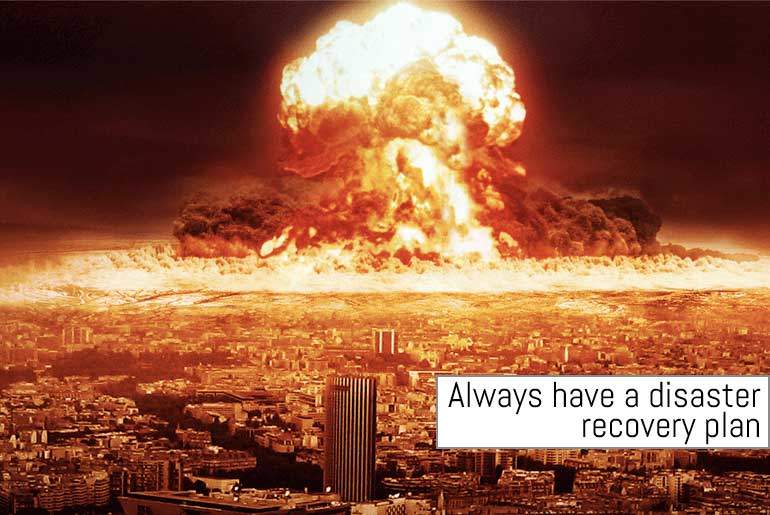Always have a disaster recovery plan

So, over the holidays I was left without access to the Internet or landline phone for 10 days. This is not fun when you’re trying to run a blog from home, or keep in contact with family and friends over Christmas. It also doesn’t help that the majority of tools you need to diagnose or track the problem are actually online.
“Surely you can use your mobile phone Katy?” I hear you ask. Well, yes. But in a cost cutting measure after tracking internet usage on my phone I decided to downgrade my data allowance as I usually connect to the internet over wi-fi – what a mistake! Sure I could get on the internet but I only had a limited amount of usage before I had to pay a stupid cost for going over my limit.
I live in a rural area, but luckily my local pub has wifi so I was able to head on over there to work – and have a couple of beers of course to be sociable! But not having the internet at home was a nightmare. No film on demand services, No catch-up T.V, limited access to email and (gasp!) No YouTube or Tumblr!
This got me thinking about having a back-up plan in place for emergencies – not just for no internet but for no power (which happens more around here than it should considering it’s 2015, not 1915), no hard drive, no computer or no phone.
Set up a paper address book
Sure, I have all of my contacts stored on my phone which syncs with my Google account in the cloud, but what if I lose my phone and my home internet is down? I have no idea what my Brother or my Dad’s mobile numbers are, heck I don’t even know what my own mobile number is! Take the time to write out your most important contacts such as:
- Famiy & Close friends
- Work Contacts (boss, P.A etc)
- Doctor
- Local Hospital
- Local Police
- Garage
- Vets
Get a mobile dongle
Grab yourself a pay-as-you go mobile dongle, that way if your internet does go down you can still get online. Make sure you check your area for coverage so that you get one which will give you a deent speed.
Check your torch batteries, or get a battery-free light
We have a couple of wind-up torches and lanterns that kick-out quite a bit of light so when the power goes out (as it does regularly here) we can see in the dark without fear of one of the cats knocking over a candle and setting fire to the house. Additionally, having a battery free torch means you don’t have a mad panic trying to find the right size batteries when the power goes out.
Keep a store of canned/packet goods and have a way of heating water
Luckily I have both gas and electricity to cook with so I have a stock of canned meals and packets that I can heat up on my gas hob (you could also use a camping stove). I’ve also bought a kettle that can be used on the hob for when you need that cup of tea.
Back-up (or clone) your computer’s hard drive
If you have a Mac, you can use time machine or Carbon Copy cloner to back-up your hard drive, if you have a PC, check out these 5 tools from Tech Republic
Update: There’s also this great video, comparison chart and breakdown of a wide variety cloud service providers from Cloudware in their “The Best Image-Based Backup and Cloning Software of 2017” post
Keep documents stored in the cloud
This is only advantageous if you can access the internet of course (!) but it means that if anything happens to your computer or backups then you still have your documents safe and sound.
Backup your paper documents
You don’t need something as serious as a safety deposit box, but you can make copies of important documents, seal them in an envelope and ask a friend or family member to look after them.
Make a note of important details
As well as keeping a copy of your contacts offline, also note down important details such as:
- Passport Number
- Driving License
- National Health Number
- National Insurance Number
- Bank Account Numbers and Sort Codes
- Car/House Insurance Details
Over to you
Hopefully you won’t need to ever put any of this into practice, but it pays to be prepared.
What do you guys think? Is there anything that should be added to the above list?


Stay Free, Stay Safe, Stay Protected. Backup your data and access it from any place, from anywhere and from any device Backup your personal photos, videos, documents, etc. from ransom. DataAlign is a first line of defence for your data.